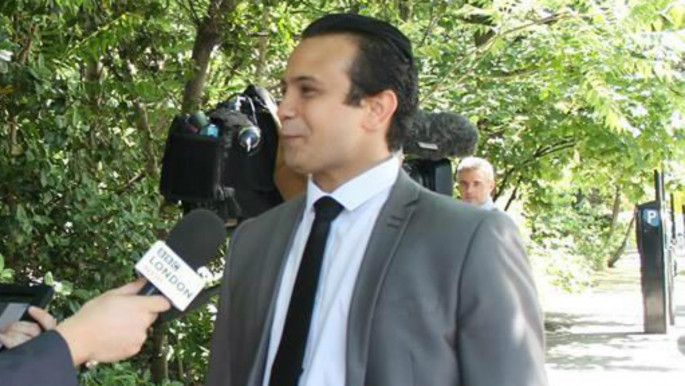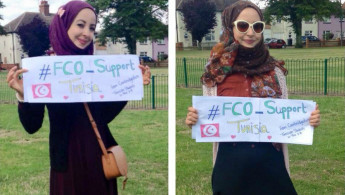Campaign urges UK to "support Tunisia"
Following the attacks, the Foreign and Commonwealth office for the United Kingdom changed their travel advice to Tunisia which now warns "against all but essential travel to Tunisia" - a disastrous move for the Tunisian economy which relies heavily upon British tourism.
 |
|
| Mehdi is urging the UK to downgrade its travel advice [facebook] |
This inspired a campaign lead by Tunisian blogger in the UK, Mehdi Behi, that seeks to pressure the foreign office to change its travel warning.
"When the attacks first happened we organised solidarity with the victims, and spoke to their families", Mehdi said.
Shortly after the attacks, the foreign office upgraded its travel warning, and travel companies, such as Thomas Cook, cancelled flights to the country until October, announced their intention to stop operating in Tunisia.
"It was a shock to myself and many others…" Mehdi said.
"The cancelled chartered flights to Tunisia affected many people...for example one person was going to see his sick father, another one was attending a wedding…there were some harsh circumstances."
However, it was the effect of the FCO advice and flight cancellations on tourism that left a lasting impact on Tunisia, where the tourism sector accounted for around 14.5% of Tunisian GDP last year.
Interestingly other countries in the region such as Egypt, who are experiencing frequent skirmishes and attacks by militants did not elicit the same travel advice.
 |
|
| Support Tunisia...from Birmingham |
"Only the UK have put such a travel warning to Tunisia in place, the rest of Europe advices caution, but we fear that Europe will follow the UK’s advice, like Ireland has," Mehdi said.
"We started a campaign on twitter called #fco_support_tunisia, which asked the FCO for support", he said, adding that last week he received over 1000 photos of people holding signs in support.
"This affects Tunisians in the UK, Brits with ties to Tunisia, and Tunisia in general", Mehdi said.
Mehdi has had extensive contact with the UK foreign office, who have sought to reassure the campaign team of their continued support for Tunisia.
"Our travel advice is based on the full range of information available to us, including intelligence sources on the ground. Our understanding of the threat has evolved since the Sousse attack", a recent reply read.
"We know our advice can have a knock-on effect on trade and political considerations, but we don’t let this influence the advice we give".
On July 20 Mehdi attended a meeting in the UK parliament between Tunisian and UK representatives, during which Tunisians said that they had put increased security measures in place.
As a result, "the UK said that they would re-examine the situation," Mehdi said.
 |
|
| support Tunisia...from Spain |
The FCO advice on Tunisia currently reads that the Tunisian authorities have "acknowledged their capabilities on dealing with counter-terrorism."
"On balance, we do not believe the mitigation measures in place provide adequate protection for British tourists in Tunisia at the present time," it says.
However, Mehdi fears that the effect of the decrease in tourism on employment and the economy in Tunisia could play into IS hands, who are said to be aiming to damage the Tunisian tourist industry and economy.
So far the financial loss to Tunisia as a result of the attacks has been estimated at £320 million.
What IS wants
"People are losing their jobs…and extremists attract people through money" Mehdi said.
Despite Tunisia's successful transition to democracy during the Arab Spring, the country is the biggest exporter of fighters to IS, with 3000 militants traveling to Iraq or Syria. Many analysts cite high unemployment among youth – around 34% - as a possible driver for recruitment.
Those working in Tunisia's tourism industry are already
| This time last year we had 800 guests, this week we have 169 guests - Hotel worker, Tunisia |
seeing the disastrous effects of the attack on their work.
"There are massive staff cuts – I used to have a team of twelve entertainers, now I only have three", said Zalfani Ayman who is head of entertainment at Rio Munsour, Mahdia, an hour’s drive away from the scene of the attacks in June.
"This time last year we had 800 guests, this week we have 169 guests," he said.
Ayman, who has been working in the hotel since 2006, said that the vast majority of tourists in the area were from the UK.
"Now we have mostly Algerian families, and some Germans and Russians", he said.
"The staff centre is closed, the shop in the hotel is closed," Aymen said, explaining that the drop in tourism does not only affect those directly employed within the industry, but also those within the informal economy.
"People who used to work on the beach with camel riding, or horse and carriages…tuk tuk drivers, taxi drivers...all have lost business" he said.
Aymen said that in the week the attacks happened, the 530 guests in his hotel were nervous to go out, but increased security measures in the months that followed have encouraged tourists to continue visiting Tunisia and seeing the sites in the area.
"There are more police, armoured cars, cameras everywhere, more security checkpoints…people see this and they feel safe…people from other European counties are arriving" he said.
"We had English guests who flew here from Munich last week, they had a great time, and contributed to Mahdi’s campaign," Aymen said.
He feels that the UK travel advice following the attacks has been a "big disaster for Tunisia".
"The decision they took is wrong…It [terrorism] could happen anywhere in the world – in America, even in London", he said.
Aymen feels that by the FCO discouraging tourism to Tunisia, IS "got exactly what they want".



